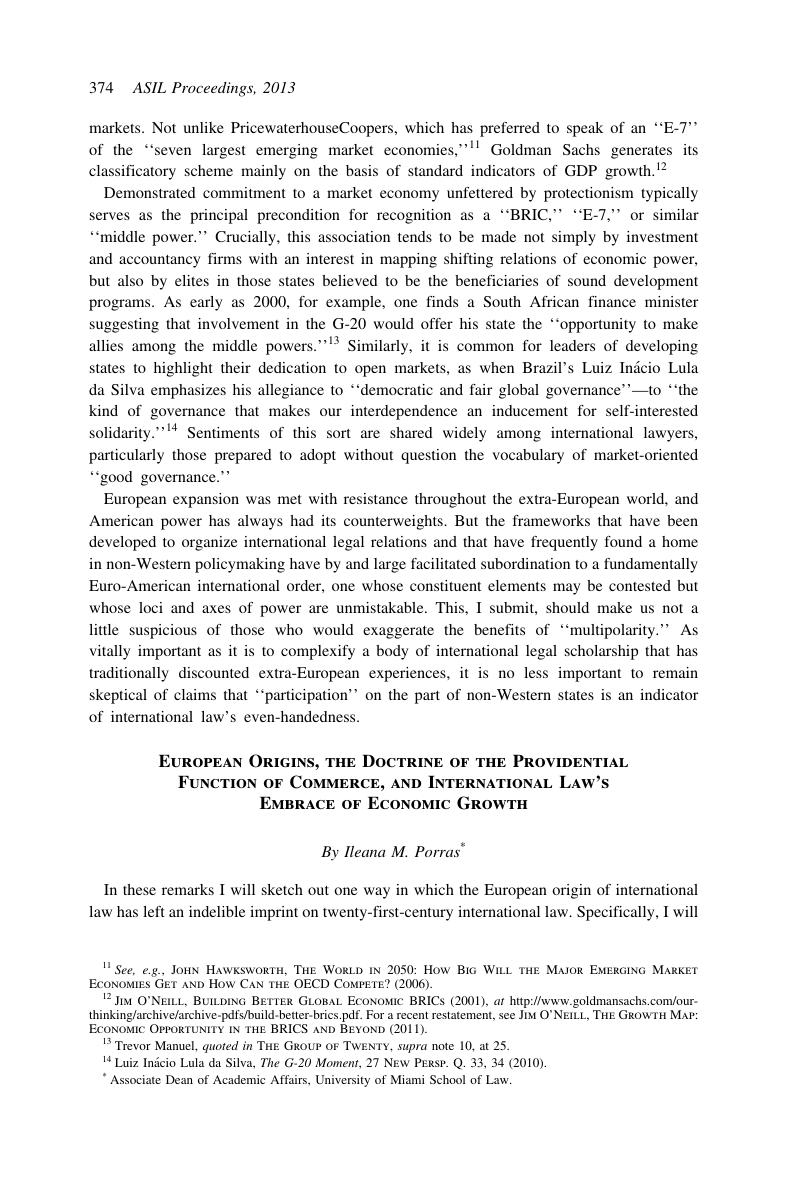No CrossRef data available.
Published online by Cambridge University Press: 20 January 2017

1 The term was coined by economist Jacob Viner. Viner, Jacob, The Role of Divine Providence in the Social Order: An Essay in Intellectual History 32 (1972)Google Scholar. For a discussion of the central role played by the doctrine in the discovery of a right to hospitality and the role of commerce in both Francisco de Vitoria’s De Indis and Hugo Grotius’ De Iure Praedae, see Porras, Ileana M., Constructing International Law in the East Indian Seas: Property, Sovereignty, Commerce and War in Hugo Grotius’ De Iure Praedae—The Law of Prize and Booty, or “On How to Distinguish Merchants from Pirates,” 31 Brooklyn J. Int’l L. 741, 756 et seq. (2006)Google Scholar [hereinafter Constructing International Law]. For a discussion of Immanuel Kant’s use of the doctrine, see Porras, Ileana M., Liberal Cosmopolitanism or Cosmopolitan Liberalism ? Notes from International Law, in Parochialism, Cosmopolitanism, and the Foundations of International Law 136 (Sellers, Mortimer ed., 2011)Google Scholar [hereinafter Liberal Cosmopolitanism].
2 For instances of non-European influences, see, e.g., Umut Özsu, The Politics of “Multipolarity,” supra at 371.
3 See e.g., Antony Anghie, Imperialism, Sovereignty and the Making of International Law (2005).
4 See, e.g., Obregon, Liliana, Noted for Dissent: The International Life of Alejandro Alvarez, 19 Leiden J. Int’l L. 983 (2006)CrossRefGoogle Scholar; Lorca, Arnulf Becker, Universal International Law: Nineteenth-Century Histories of Imposition and Appropriation, 51 Harv. Int’l L.J. 475 (2010)Google Scholar; Gathii, James, A Critical Appraisal of the International Legal Tradition ofTaslim Olawale Elias, 21 Leiden J. Int’l L. 318 (2008)Google Scholar.
5 TWAIL (Third World Approaches to International Law) scholars in particular have explored the ways in which international law has been predisposed to serve the evolving interests of the West, emphasizing the economic relations it sets up and the persistence of unequal distributional effects on Third World peoples. See, e.g., The Third World and International Order: Law, Politics and Globalization (Antony Anghie, Bhupinder Chimni, Karin Mickelson & Obiorą Okafor eds., 2003).
6 Anghie, supra note 3.
7 Constructing International Law, supra note 1.
8 See Emmanuelle Jouannet, Le Droit International Liberal-Providence: Une Histoire du Droit International (2011).
9 Viner, supra note 1.
10 Constructing International Law, supra note 1.
11 See, in particular, Kant, Immanuel, Idea for a Universal History with a Cosmopolitan Purpose (1784), in Political Writings 41 (Reiss, Hans ed., 2d ed. 1991)Google Scholar; Kant, Immanuel, Perpetual Peace: A Philosophical Sketch 93 (1795)Google Scholar; Immanuel Kant, The Metaphysics of Morals 131 (1797).
12 Liberal Cosmopolitanism, supra note 1.